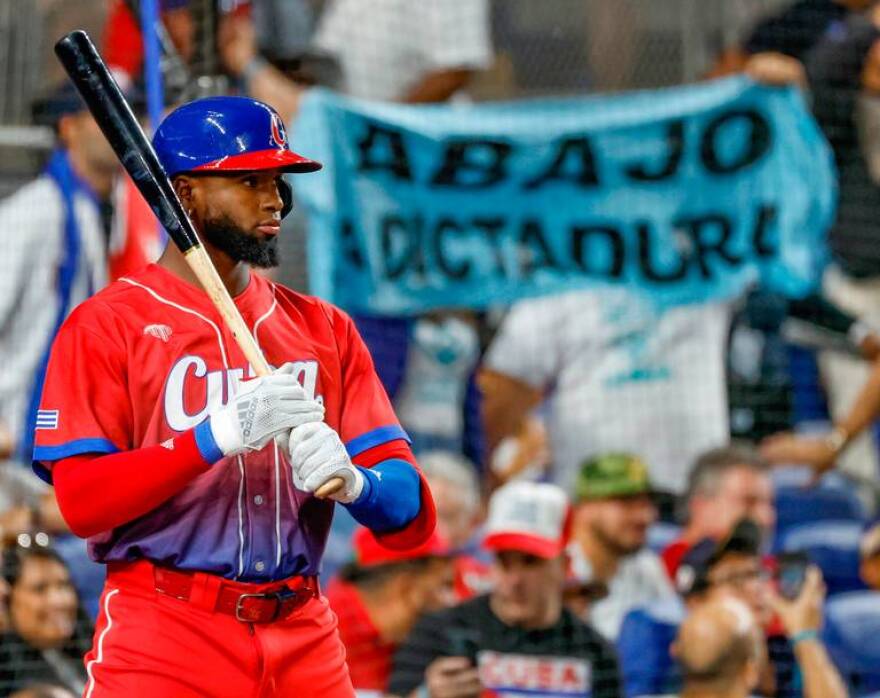COMMENTARY Cuban baseball today seems a reminder of the island's massive youth exodus — which ought to make it a handy showcase of what Cuban exiles protest.
If you ask me, last Sunday night’s visit to Miami by the Cuban national baseball team was everything Cuban exiles could have wanted.
And I say that because I’m old enough to remember what great Cuban baseball once looked like.
I was at Baltimore’s Camden Yards ballpark in 1999 when Cuba played the Orioles in a historic exhibition game. It was the first time Cuba had faced a Major League squad in the U.S. in 40 years — and it routed the Birds, 12-6. Norge Luis Vera pitched seven no-hit innings; torpedero (shortstop) Danel Castro hit 4-for-5, including a 2-RBI triple; third baseman Andy Morales hit a 3-run homer.
Contrast that with what we saw Sunday night at Miami’s LoanDepot Park. In a World Baseball Classic semifinal game, the U.S. not only eliminated the Cubans — or Team Asere, as the side is now known — it buried them, 14-2. U.S. batters lit up Cuban pitchers with enough power to solve the island’s chronic electricity outages — including four home runs, one of them a 3-run shot by Trea Turner. The Cubans’ most memorable fielding moment was a train wreck in left field between third baseman Yoán Moncada and outfielder Roel Santos as they chased a pop-up.
READ MORE: Ann ale, Grenadiers! The Haitian women's soccer team is the Haiti we should root for
Sure, any team can have a bad night. And Team Asere can argue it was still jet-lagged after flying in from Tokyo — or that it was distracted playing in the Cuban exile boiler room of Little Havana, where everything from baseball to ropa vieja recipes gets rabidly politicized.
Still, I couldn’t help notice a decidedly enervated vibe from this Cuban crew, a feeling that it's largely a team drawn from a rapidly shrinking pool of talented youth — who in recent years have been abandoning their communist country in droves by the day if not by the hour.
And, let’s face it, that’s essentially what the Cuban national baseball team is today. I don’t think it’s a stretch to suggest a connection between the comparatively reduced caliber of beisbol cubano we witnessed on Sunday, and the fact that the only portion of Cuba’s population that’s growing right now is folks 60 and over.
It's not a stretch to suggest a link between the comparatively reduced caliber of beisbol cubano and the fact that the only part of Cuba’s population that's growing is folks 60 and over.
So, if I were a Cuban exile, I’d be welcoming showcases of dictatorship-driven deterioration like that into the Magic City.
I’d be glad to have a live reminder on hand when I’m pointing out the brutal human rights repression (a thousand political prisoners languishing in cells merely for taking part in anti-regime protests) and the dogmatic economic catastrophe (a common media refrain of late: “there is no milk in Cuba”) that drove 313,000 Cubans to the U.S. last year, a sixfold increase over 2021, most of them young people.
Complicated Demand
I sure wouldn’t be screaming for a great public speaking prop like that to be turned back at Miami International Airport, as exile honchos like Hialeah Mayor Steve Bovo kept demanding last week.

That’s a highly complicated demand in any case. Let's say the U.S. should boot a baseball team out of an international tournament in Miami because of the government running the nation it represents. If that were the case with Cuba, the U.S. would have also had to bar the Venezuelan and Nicaraguan national teams that played games here — and China’s if it had made it to the Miami stage — because their countries' dictatorships are international rights pariahs, too.
Which ought to remind Cuban exiles of something else. Over the decades, fairly or not, they've acquired a rather solipsistic global image. That wasn't improved much last weekend when the cameras were on them outside LoanDepot Park — and they didn’t take the opportunity to also rail against those other tyrannical regimes sending teams to their street. Venezuelan and Nicaraguan exiles hurt, too, by the way.
Then again, those other exiles seemed to understand what many Cubans here didn’t. Anyone who’s been to the Miami suburb of Sweetwater lately has seen the bursting infusion of migrant youths escaping Nicaragua’s dictatorship. Maybe that’s why we didn’t hear many if any Nicaraguan exiles calling for Nicaragua’s national team to be banned from the WBC’s opening group round in Miami.
Maybe they decided it was more useful for their cause to have the world see that team lose every game it played.






